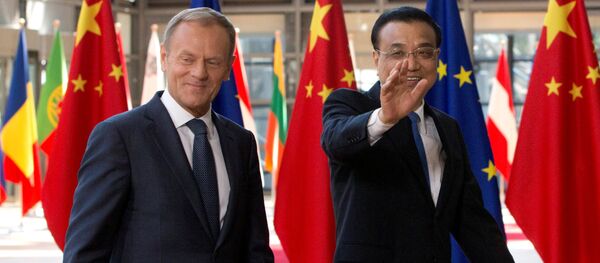Sputnik spoke to Douglas Arner, professor of finance at Hong Kong University, who took part in the forum.
Sputnik: What's your opinion about this forum?
Douglas Arner: You know it is something that financial inclusion and financial sector development have long been very important policy objectives and organizations like AFI which try to bring together, in particular, developing countries and emerging markets from around the world to talk about common problems, common experiences, I think are very valuable. I think in the context of this event, seeing a response from 80-90 countries around the world in a week-long event, is really very exciting.
READ MORE: Jack Ma to Reveal an Alibaba Succession Plan, But Not 'Stepping Down' Right Now
Douglas Arner: This is the big question and I think when we are thinking about, fintech it's important to think about fintech bringing together four big picture trends that have been happening for a while. The first is a long-term digitization of traditional finance; if it looks at traditional finance, it's already a largely digitized business. The second, is an explosion in new startups around the world: fintech startups coming in to challenge, and I think this is interesting, because some are about challenging traditional institutions, but just as many are about selling them services, for assistance, in risk management or financial products are partnering with them in some way.
Actually, the largest outcome for many fintechs is being acquired by a financial institution and integrated into operations. Our third big trend is really about developing countries and this is where we look at China in particular. China over the past 10 years has seen a more rapid digital financial transformation than any country in the history of the world and this is largely been built on a framework of smartphones and using a variety of Internet and e-commerce platforms, such as Alibaba, Tencent across those smartphones. In China it hasn't been a priority to replace one system or another, rather it's been allowing a new system to emerge to compete with existing systems. I guess that's our fourth big trend, which is about tech companies entering into financial services and some of the challenges that this is bringing, as well as some of the benefits. When we're looking at China, in particular, it's a very exciting example of a process that we're seeing in a range of developing countries and emerging markets around the world.
READ MORE: US Labor Market Firms in August, Larger Wage Growth Points to Quicker Inflation
Sputnik: Because of the high pace of progress in the field of financial accessibility, it is increasingly difficult for authorities to monitor the risks to the financial system and, even more, in a timely manner to respond to them. Can you comment on this?
Douglas Arner: When we look at these big pictures in fintech, the two things that have really changed in the past 10 years are, first, the explosion in speed of development. From the standpoint of regulators, they really have to continually spend time watching and learning to see what are the new technologies emerging, how are they being used, what are the opportunities, but very much also what are the risks. Also, of course, the second has been an explosion in the "who," new entrants in the market and this combination for regulators is both a real opportunity in transforming financial inclusion, but it's also a challenge in the context of balancing risks and opportunities. Really, the key is focusing on monitoring, figuring out what's going on, so that they know the right way forward.
The views and opinions expressed by Douglas Arner are those of the speaker and do not necessarily reflect those of Sputnik.


